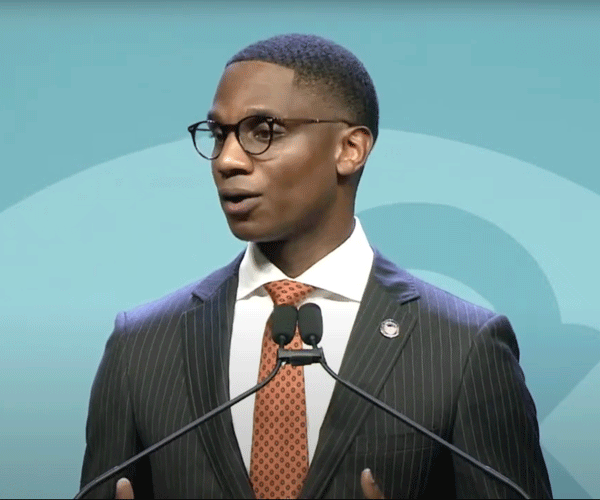Jane Campbell
Age: 52
Experience: Mayor of Cleveland
Where we met: The Superior Restaurant
It’s 7:20 a.m., and the mayor is sipping cof fee at this booths-and barstools breakfast place at East 30th Street and Superior Avenue frequented by union workers. Over the next hour, several come by and shake her hand. She’s been up since 5 a.m., doing her usual Wednesday morning media appearances, yet Campbell looks more awake than many here, including the super busy waitress who calls her “hon.” Some critics say Campbell can’t command large audiences, but one-on-one she’s disarming. She makes things easy for you. She often meets people here, for instance, because of the convenient location. She’s also focused and quick with a compliment or an answer to any question.
Greatest accomplishments: “Rebuilding the basics of city government” (for instance, “making sure the Finance Department could add and subtract”) and assembling resources and support for about $2 billion in development: almost $1 billion in medi cal-related projects, including the new $320 million Cleveland Clinic Heart Center, plus the $240 million Euclid Avenue Cor ridor project, $65 million in new lakefront activity and several housing developments.
Greatest disappointment: “How little money we have.”
“Casino Mayor”?: Might her support for a casino in Cleveland eclipse all that she’s done for people in her career, including battered women, children and single moth ers moving off welfare? The casinos are about helping people, too, she says: “The casinos are about people working. ... It’s jobs.”
Is she too “nice” to be mayor?: “People who know me go, ‘Oh, yeah? Don’t cross her.’ ... I think being clear about what you want doesn’t require you to be nasty. Frankly, I think this whole discussion about me being nice is about people not being able to deal with female leaders.” Behind-the-scenes work: Her administration checks up on small- and medium sized businesses instead of waiting until they’re in trouble, she says.
Three goals if she wins a second term: Keep building the city’s medical sector, from health care to medical-device manufacturers. Strengthen the school system with new top-quality magnet schools like Cleveland School of the Arts. Strengthen small and advanced manufacturing and erase the idea that technology jobs and manufacturing jobs are two different things.
Does she want to be governor someday?: “I honestly don’t know. I think you do one job at a time, and I want to do this job.”
Web site: www.campbellforcleveland.com — Jacqueline Marino
James Draper
Age: 64
Experience: Former Cleveland safety director and county public defender
Where we met: The Juniper Grille on Carnegie Avenue I’m expecting to meet Draper for a personal chat at one of his favorite places. Instead, I’m joined by the Draper machine, which includes the candidate as well as four campaign staffers. And when I ask Draper why the Juniper Grille is special to him, he stifl es a yawn and says he doesn’t have any one favor ite place. “His favorite place is probably a church,” offers Draper’s public-affairs con sultant, adding that he didn’t think I’d want to meet on a Sunday. So here we are. And here’s what I fi nd out.
On his childhood: After his father died in 1948 when Draper was 7, the family moved into public housing. Four years later, Draper’s mother remarried, bringing more money and happiness to the family. “We were poor,” Draper says. “But that’s not an excuse to be bad. Nobody owes us anything except a choice and opportunity.”
Draper’s climb: He started as a Cleveland police officer, rose to the rank of detective and then went to college, earning his bachelor’s and law degrees from Cleveland State University. After a few years as a trial lawyer, he served as Cuyahoga County’s chief public defender and then as Cleveland’s safety director under Mayor Jane Campbell. He left that post after two years.
Why he left: “Because it was my choice.” That’s all he’ll say. (It’s been speculated that he disagreed with how Campbell handled the 2003 police layoffs.)
Safety first: Given his background, it makes sense that Draper would focus first on crime. A few of his ideas are to restore the gang unit, crack down on street thugs and decentralize police operations.
The turnaround guy: Draper doesn’t do much boasting, but his staff says we should know one key thing about him: With nearly every job he’s taken, he’s inherited a stack of problems. He solves them.
His hopes for Cleveland: “There is a malaise that hangs over the city,” he says. “We want the city to feel good about itself again.”
Web site: www.jamesadraperformayor.com
—Colleen Mytnick
Frank Jackson
Age: 59
Experience: Cleveland City Council president
Where we met: The community center at Arbor Park, a new 600-home townhouse development in Jackson’s ward Jackson and I sit out on a brand-new patio, surrounded by beautiful new townhouses. They’d sell for $190,000 else where, Jackson says, but they’re government-subsidized, built for working poor who pay 30 percent of their income in rent. When the federal government wanted to tear down a subsidized slum on the land and scatter its residents across town, Jackson insisted on recruiting a developer, building new homes here and moving the old project’s residents in. “That’s why I brought you here,” he says, “so you can see that I get stuff done.”
How he thinks voters should judge his work in four years, if he’s elected mayor: “Whether or not the least of us are better off.”
Why he’s running: “This is the only time in all of my life, living in Cleveland, that I go into the neighborhoods and talk to just the average person who says they just want to leave Cleveland. And you say, ‘Why?’ They say nobody cares about them. They’re talking about all these approaches to things that [don’t] even address what their needs are.”
Why he sees himself as different from other candidates: “This is my home. I’m not a transplant. I don’t live on the edge of the problem.” (Opponents Draper, Lynch and Nelson moved in from the suburbs within the last few years, while Campbell and Triozzi live within a block of the city limits, he notes.) “Everything that has happened in this community has happened to people that I care about.” He has family members who are in jail, who’ve been addicted to drugs, who are alcoholics, who are unemployed and homeless, he says.
Most important legislation passed while he’s been council president: The Fannie Lewis Law, which requires 20 percent of the jobs on projects receiving more than $100,000 in city money to go to Cleveland residents. Also, a tough law against preda tory lending.
His freshest economic-development idea: A regionwide incentive pack age of grants and tax abatements to attract businesses, so local govern ments aren’t “stealing from each oth er” by offering different deals.
What he thinks of his reputation as quiet and reserved: “I don’t look for glory or look for accolades. One of the prob lems I have in this campaign, I guess, is people will say, ‘I didn’t know he did all those things!’ because I don’t toot my own horn.”
Web site: www.frankjacksonformayor.com
—Erick Trickey
Bill Patmon
Age: 59
Experience: Former Cleveland city councilman
Where we met: DJ’s Restaurant Bill Patmon arrives at this friendly Glenville lunch spot on East 105th Street, says hello to the owner and tells me she and her husband came to Patmon in the ’90s, when he was on council, for help getting permits to open the place. Patmon had spent years trying to coax development into the area, so he was “giddy” that someone was eager to do business there without even asking for a grant or a loan. “At that point, I knew my neighborhood was going to survive.” Sure enough, a big shopping center and other developments soon came to East 105th and St. Clair Avenue, Glenville’s main intersection.
Patmon’s inspiration for entering politics: John F. Kennedy’s assassination; the reruns of Kennedy’s speeches convinced Patmon, then 16, that politics was “an honorable profession, something that improved the human fabric.”
Why he thinks he’s the best person to handle Cleveland’s challenges: “I was in [city] government when we actually implemented most of the things people are suggesting as change: streamlining government, making government customer-friendly, lead with economic development, get involved in the school system to [create] real improvement. … Who has the political know-how to get it done? I don’t think anybody’s close on political know-how.”
How he helped businesses as a councilman: “Political muscle and cajoling,” he says. When city officials came to council for help with their priorities, Patmon explains, “You said, ‘Well, wait a minute, I have a couple of loans back here that haven’t been looked at.’ ”
His take on regionalism: He’s for “regional agreements, not regional government.” He’d like the police department to share more resources with inner ring suburbs and the county sheriff, from crime information to helicopter patrols.
Why he thinks he lost his council seat in 2001: “I lost because I was running two races. And I made some mistakes,” he says. “I was trying to become [council] president at the same time I was trying to be reelected as councilman.” He also got caught up in the battles between council and then-Mayor Mike White. “I was quoting ‘The Art of War’ when I should’ve been quoting Proverbs. You can accomplish much more with love than you can with hate, with peace than you can with war.”
Web site: www.billpatmonformayor.com
—Erick Trickey
David Lynch
Age: 48
Experience: Former mayor of Euclid
Where we met: St. Paul Shrine Before we sit down to talk, David Lynch takes me on a tour of the quiet, European-style church at Euclid Avenue and East 40th Street, home to a Capuchin monastery and the Poor Clares of Perpetual Adoration, cloistered nuns who spend their days praying and who never leave the monastery. “It’s my favorite place in Cleveland because you can fi nd people doing nothing but good things and doing them in a complete state of anonymity,” says Lynch. He considers the shrine a “spiritual escape hatch” from day-to-day life and stops by sometimes on weekdays.
Biggest accomplishment in politics: “Turning around the deficit that the city of Euclid faced when I was mayor there, a several-million-dollar deficit. When I left the mayor’s office, we had a very sizable surplus.”
Why he’s running: “You can almost hear a voice in Cleveland, a collective voice, saying, ‘Will somebody please do something?’ ”
Why he thinks he’s the best choice: His “successful tenure of running a major-sized city.”
What he’s done since leaving the Euclid mayor’s office in 1995: Practiced law, served as Westlake’s law director, done video production and political commentary on channels 8 and 3. What regionalism means to him: He wants the suburbs and rural areas of Northeast Ohio to share some of their tax revenue with the city. He thinks they’ll agree to do it for “their own survival,” because Cleveland’s fortunes affect the whole region.
How he thinks voters should judge his work in four years, if he’s elected: Job creation and the public schools’ performance on graduation rates and standardized tests. If those two areas improve, he predicts, everything else will improve, too.
Should Cleveland elect a mayor who just moved to town in December?: “If people consider that we’re all Clevelanders, and I think that they do, the answer to that is yes. I think the citizens are looking for somebody who can make things better. That’s the No. 1 criterion.”
His political party: Republican How electing a Republican mayor would help the city: By “freeing up our citizens from taxation and regulation and giving the community the opportunity to soar,” he says.
Web site: www.lynchformayor.com
—Erick Trickey
Michael L. Nelson
Age: 56
Experience: Lawyer specializing in public finance; political organizer
Where we met: Gookies restaurant This trendy eatery, with pictures of jazz musicians on its yellow-and-purple walls, graces a stretch of Superior Avenue near East 78th Street better known for empty storefronts and barbed wire. Nelson likes the food here, but he also picked Gookies because students being mentored by 100 Black Men of Greater Cleveland helped write its business plan. As president of the group and a former Cleveland public-school teacher, Nelson puts children at the center of his platform.
Priority No. 1 as mayor: Education, specifically making the public schools the nurturing environment they once were for black children. “One thing you cannot afford to be without in a school system is extracurricular activities,” he says, stressing that more activities mean fewer discipline problems.
His childhood mentor: His grandmother, also a former Cleveland public-school teacher.
Political experience: He organized college students for Carl Stokes’ second mayoral run in 1969, then for mayoral candidate Arnold Pinkney in the ’70s and former Gov. Dick Celeste and Jesse Jackson in the ’80s. He ran former Mayor Mike White’s fi rst state senate campaign in 1984 and helped U.S. Rep. Dennis Kucinich during his presidential bid last year. He’s on the boards of the Northeast Ohio Regional Sewer District and Central State University.
What he’s learned from politics: “Don’t take anything for granted,” he says. “The people who will disappoint you most are the people who you have helped the most.” As an example, he mentions some minority business contractors who haven’t reached out to others after accepting help themselves.
Why he thinks the city needs him: “We’ve got a do-nothing City Council president and a do-little administration,” he says. “I can excite this community and give it the confidence it has lost.”
Notable quirk: Even though Nelson’s wearing two watches, he’s about 25 minutes late to the interview. Being behind the scenes on political campaigns for years, he’s still getting used to being the one who has to keep appointments.
Web site: www.michaelnelsonformayor.com
—Jacqueline Marino
Robert J. Triozzi
Age: 48
Experience: Former Cleveland Municipal Court judge
Where we met: The deck overlooking the water at the end of Bonniewood Drive in Collinwood On a sweltering summer day, there’s a breeze and the lulling sound of water rolling onto the small beach. Triozzi proposed to his wife, Monica, here and three of his four children were born during the nine years they lived on the street. Triozzi developed a passion for public life here, too, with his earliest role as block club president. The neighbors I happen across still know him and pledge to do anything they can for the campaign, including bringing us a pitcher of cool wa ter.
A front-row seat: As a judge for 10 years, Triozzi says he had an intimate view of the city’s problems. “I saw the ramifications of poverty every single day. I saw the face of poverty every single day.”
The most important question he can ask a defendant: Do you have a job? “It tells me where we can go from there,” he says. “Employment is fundamental to turning a community’s situation around. It’s what builds people up.”
But how do we create more jobs?: Embrace new manufacturing opportunities, such as medical devices, he says. Expand international trade. Aggressively market our industrial parks. Support the hospitality industry by building a convention center.
How he bills himself: As someone with creative solutions.
An example: A case came before Triozzi last year in which a woman had an $1,800 Discover Card debt, had made payments doubling that and still owed $5,600 more because of late charges. He made national news by ruling that she didn’t have to pay because she’d been the victim of “unreasonable, unconscionable and un just business practices.”
Another example: To use John Hay High School (located near University Hospitals and the Cleveland Clinic) for an intense work study program for students interested in health care careers.
Web site: www.triozziformayor.com
— Colleen Mytnick



